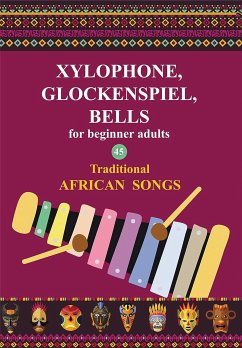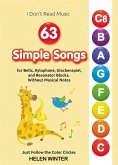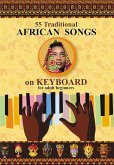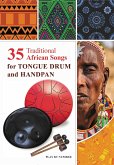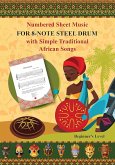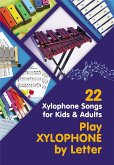The xylophone is the most important traditional folk instrument on the African continent, alongside the drum. Usually, African scales differ from Western ones. The African xylophones mostly have 5, 6, or 7-note (pentatonic, hexatonic, heptatonic) scales, while Western instruments typically have a diatonic scale. Rhythm is the most distinguishing characteristic of African music and it always prevails over the melody.
The songs in this e-book have been adapted and can be played on all models of popular wooden xylophone, metal glockenspiel (metallophone), or resonator blocks. Even a simple kids' xylophone will be adequate to play most of these songs. Some songs here have been simplified for beginners.
The same song played on a wooden xylophone and on a metallophone will result in very different sounds. Due to their clear rhythmic patterns, African songs are an ideal material for any kind of musician. You will find both diatonic and chromatic scores. Some melodies have been especially transposed to a diatonic range to allow you to play them on the most popular models of xylophone, which normally do not have flat notes.
This e-book is aimed at those new to music and musical instruments and I put letter notation above the notes to make it possible for you to confidently begin playing.
Since African music assumes improvisation and variation, I recommend using this sheet music only as a guide. The most important thing is to listen and repeat the recordings linked to the QR code, so you can listen to the rhythm before beginning to play.
Contents:
1. Amawole - Song from Congo
2. Askari Eee - Song from Tanzania
3. Atadwe - Song from Ghana
4. Banaha - Song from Congo
5. Banuwa - Song from Liberia
6. Bebe Moke - Song from Congo
7. Before Dinner - Song from Congo
8. Bilanga Na Ngai - Song from Congo
9. Che Che Koolay - Song from Ghana
10. Coco Laye-Laye - Song from Congo
11. Do Do Ki Do - Song from Cameroon
12. Eh Soom Boo Kawaya - Song from Nigeria
13 Erile Baboye - Song from South Africa
14. Famba Naye. Song from Zimbabwe
15. Funga Alafia - Song from Ghana
16. Iro Ye - Song from Benin
17. Kanzenzenze - Song from Congo
18. Kokoleoko - Song from Liberia
19. Kotiko - Song from Congo
20. Kuya Mbio - Song from Tanzania
21. L'abe igi Orombo - Song from Nigeria
22. Makun - Song from Mali
23. Manamolela - Song from South Africa
24. Mayo Nafwa - Song from Zambia
25. Mbele Mama - Song from South Africa
26. Ning Wendete - Song from Kenya
27. Noyana - Song from South Africa
28. Obwisana - Song from Ghana
29. Olélé Moliba Makasi - Song from Congo
30. Plouf Tizen Tizen - Song from Algeria
31. Sansa Kroma - Song from Ghana
32. Sélinguenia - Song from Kenya
33. Shosholoza - Song from South Africa
34. Si Ma Ma Ka - Song from Ghana
35. Si Si Kumbale - Song from South Africa
36. Sindi - Song from Burkina Faso
37. Siyahamba - Song from South Africa
38. Siyanibingelela - Song from South Africa
39. Stick Passing Song - Song from Uganda
40. Tue Tue - Song from Ghana
41. Umele - Song from South Africa
42. Wa Wa Wa - Song from Congo
43. Welcome Song - Song from Uganda
44. Zimbole - Song from South Africa
45. Zomina - Song from Togo
The songs in this e-book have been adapted and can be played on all models of popular wooden xylophone, metal glockenspiel (metallophone), or resonator blocks. Even a simple kids' xylophone will be adequate to play most of these songs. Some songs here have been simplified for beginners.
The same song played on a wooden xylophone and on a metallophone will result in very different sounds. Due to their clear rhythmic patterns, African songs are an ideal material for any kind of musician. You will find both diatonic and chromatic scores. Some melodies have been especially transposed to a diatonic range to allow you to play them on the most popular models of xylophone, which normally do not have flat notes.
This e-book is aimed at those new to music and musical instruments and I put letter notation above the notes to make it possible for you to confidently begin playing.
Since African music assumes improvisation and variation, I recommend using this sheet music only as a guide. The most important thing is to listen and repeat the recordings linked to the QR code, so you can listen to the rhythm before beginning to play.
Contents:
1. Amawole - Song from Congo
2. Askari Eee - Song from Tanzania
3. Atadwe - Song from Ghana
4. Banaha - Song from Congo
5. Banuwa - Song from Liberia
6. Bebe Moke - Song from Congo
7. Before Dinner - Song from Congo
8. Bilanga Na Ngai - Song from Congo
9. Che Che Koolay - Song from Ghana
10. Coco Laye-Laye - Song from Congo
11. Do Do Ki Do - Song from Cameroon
12. Eh Soom Boo Kawaya - Song from Nigeria
13 Erile Baboye - Song from South Africa
14. Famba Naye. Song from Zimbabwe
15. Funga Alafia - Song from Ghana
16. Iro Ye - Song from Benin
17. Kanzenzenze - Song from Congo
18. Kokoleoko - Song from Liberia
19. Kotiko - Song from Congo
20. Kuya Mbio - Song from Tanzania
21. L'abe igi Orombo - Song from Nigeria
22. Makun - Song from Mali
23. Manamolela - Song from South Africa
24. Mayo Nafwa - Song from Zambia
25. Mbele Mama - Song from South Africa
26. Ning Wendete - Song from Kenya
27. Noyana - Song from South Africa
28. Obwisana - Song from Ghana
29. Olélé Moliba Makasi - Song from Congo
30. Plouf Tizen Tizen - Song from Algeria
31. Sansa Kroma - Song from Ghana
32. Sélinguenia - Song from Kenya
33. Shosholoza - Song from South Africa
34. Si Ma Ma Ka - Song from Ghana
35. Si Si Kumbale - Song from South Africa
36. Sindi - Song from Burkina Faso
37. Siyahamba - Song from South Africa
38. Siyanibingelela - Song from South Africa
39. Stick Passing Song - Song from Uganda
40. Tue Tue - Song from Ghana
41. Umele - Song from South Africa
42. Wa Wa Wa - Song from Congo
43. Welcome Song - Song from Uganda
44. Zimbole - Song from South Africa
45. Zomina - Song from Togo

